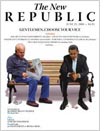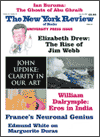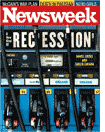Webb's the Man?
The New Republic and New York Review of Books on the possible Barack Obama/Jim Webb ticket.

New Republic, June 25 The cover story profiles the legendary temper of Virginia Sen. Jim Webb. The possible Democratic veep is "the angry white politician to Obama's mild-mannered black one." But the article contends, "oddly, Webb has something fundamental in common with Obama. Both men felt ill at ease at elite schools, leading them to embark on quests to rediscover their ethnic identities in their twenties."… A piece examines why Hillary Clinton's loss has enraged some middle-aged feminists. It's partly because of a "simple longing" for a female president who would be "a shining triumph for a movement that has lately had more disappointments than successes." It's also that "seeing Clinton losing to a younger, more charismatic man seemed to echo a primal experience of middle-aged female humiliation." But Clinton's true dedication to feminism will be seen in whether she rallies her supporters behind Barack Obama: "It would be the grimmest irony imaginable if feminist irredentism helped elect a candidate as anti-feminist as John McCain."

New York Review of Books, June 26
The piece on Jim Webb notes that the "warrior-intellectual" is "a serious writer, not a politician who writes books on the side." The article suggests that Webb "offers a fresh approach to politics and stirs an excitement that would provide the ticket with more pizzazz than would some of the more conventional figures whose names are in play," and his Appalachian "roots lie in exactly the area in which Obama has shown his greatest weakness so far." Webb himself "has argued that a combination of blacks and the Scots-Irish working class could form an electoral majority" that could propel Democrats to victory. (Slate's Timothy Noah would beg to differ.) … An essay by William Dalrymple discusses eroticism in early Hindu culture and spirituality. According to the piece, "[i]n the Hindu scheme of things, the gratification of kama"—that is, sexual desire—"remains one of three fundamental goals of human existence, along with dharma—duty or religion—and artha, the creation of wealth."

Weekly Standard, June 16 The cover story examines what Hyde Park, Barack Obama's Chicago neighborhood, reveals about the candidate and how it "may be partly responsible" for his aura of elitism. Hyde Park is a product of the University of Chicago's 1950s "ambitious scheme of urban renewal." In order to preserve the neighborhood from white flight and real-estate speculators, the school bought up the area and redesigned it with city and federal funds. The result: an isolated, highly affluent, racially integrated (thanks to the "enlightened liberals" at the university) district that "lacks the freewheeling energy of a college town, and…the surprises and variety of a healthy city neighborhood." In other words, it's "the perfect place for a man without an identity to make one of his own choosing."... A piece argues Republicans should use high gas prices to draw attention to the Democratic Congress' inaction on energy legislation. While they're at it, GOPers should take on "every big issue they can: Offer solutions and dare Democrats to act" to enhance the public's notion that the current one is a "do-nothing Congress."

New York, June 16 An article in the "Best Doctors" issue visits the AIDS/HIV epidemic in the age of multidrug cocktails that can keep the virus at bay long enough for patients to die from natural causes. But now that AIDS victims are living longer, some researchers suspect certain side effects could be fatal. It's known that the protease inhibitors increase a patient's chances of heart disease. But they could also bring an increased likelihood of "cancers, liver and kidney failure, and other chronic diseases."… In a piece, writer Kevin Baker explores his genetic destiny. After his mother was unexpectedly diagnosed with Huntington's disease, a genetic neurological disease, Baker learns that he too will develop and die from the illness. He reflects: "[I]t's the small stuff that we crave. That's what gives us the illusion that life is infinite, the only thing that saves us from the terror of consciousness, the root of which is that uniquely human knowledge that we are going to die."

Newsweek, June 16 The cover story on the economic crisis, written by Slate"Moneybox" columnist Daniel Gross, explains why "this downturn is likely to last longer than the eight-month-long recession of 2001." Now the economy "is being dragged down by the cement shoes of a freaked-out consumer and a punk housing market." What's worse is that "at root, $4-per-gallon gasoline and $20-per-pound steaks are largely a function of the changing economic geography, and the diminished stature of the U.S."—which means it will be more difficult for the U.S. financial system to bail itself out. … An interview with Craig Venter, the scientist "who decoded the human genome faster than anyone else," reveals Venter's latest goal: to create an "energy bug—a bacterium that will ingest CO 2, sunlight and water, and spew out liquid fuel." Venter says, "reducing the amount of CO 2 going into the atmosphere is very clearly a positive thing. If humanity can match that challenge, it would be a very important step towards our long-term survival."